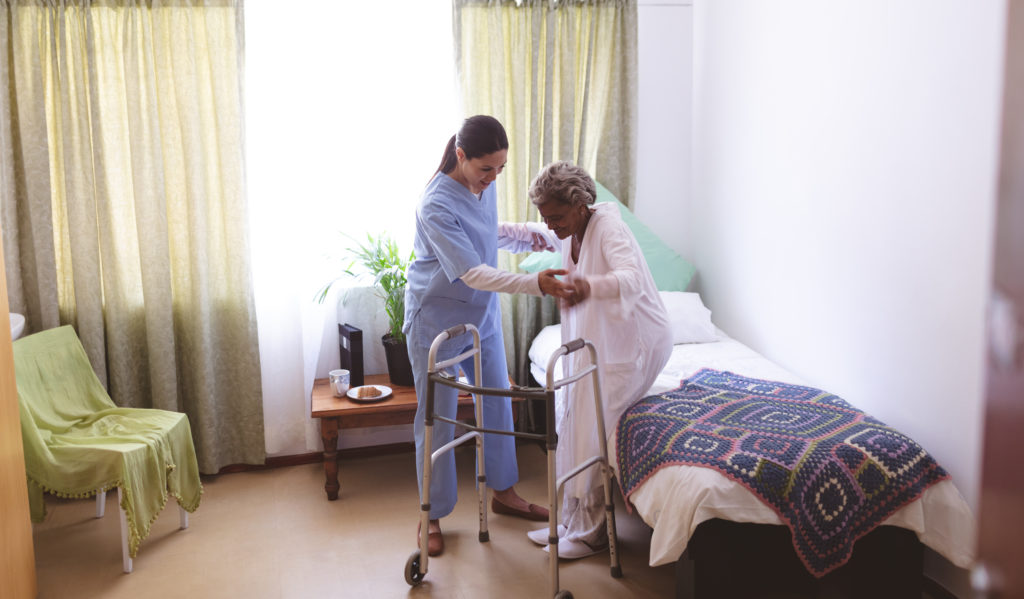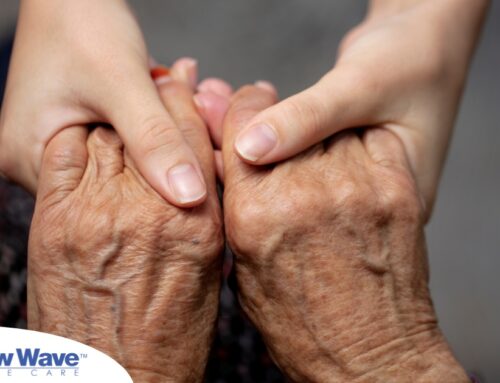Transitioning home from a hospital stay is often a tedious process. Avoiding readmission proves more challenging than most people expect. With the highest risk for readmission in the first 30 days of returning home, patients experience increased vulnerability to infection, procedural complications, falls, and many more obstacles. Adults over the age of 65 experience especially high readmission rates, which can implicate patients in a frustrating “revolving door” of hospital stays.
Following a strategic transition home can help seniors avoid medical complications and the risk of readmission. A proper home transition requires a safe and slow return to one’s daily routine–and sometimes help with doing so. Caregiving professionals can provide the assistance needed to ensure the process goes smoothly. Many in-home care services offer transitional care plans for patients returning home from a hospital stay. Even for individuals who do not usually utilize in-home care, temporary transitional care might be a useful service to consider.
Why Utilize Transitional Care?
When returning home from a grueling stay in the hospital, many patients want to hit the ground running. People are likely to over-exert themselves shortly after arriving back home. Transitional care creates a buffer from this over-exertion. Although the practice of “taking things easy” might be frustrating, it can speed up recovery time and prevent accidents. In-home caregiving can help patients remain precautious by helping with a gradual return to a daily routine.
Caregivers can also alleviate daily burdens that might tire out a recovering senior. Some patients might simply need someone to take over the reigns for a bit so that they do not tire themselves out. Other elderly patients might need more intensive care during their recovery. Regardless of an individual’s experience readjusting, transitional caregivers can make this experience as easy, and safe, as possible.
The Basics of Transitional Care
Transitional care plans range from a variety of time frames and intensities of care, depending on a patient’s needs. A professional caregiver, along with recommendations from a doctor, can assess the level and duration of care their patient might need when returning home. During this transition, caregivers aim to prevent the most common causes of readmission. Typical transitional care services include transportation to and from medical appointments, help taking medications, meal prep, household chores, and mobility assistance. Once a patient is fully recovered from their hospital stay, their caregivers and doctors might assess what their caregiving needs are going forward.
New Wave Home Care’s “Transitions of Care”

New Wave Home Care’s “Transitions of Care” program offers comprehensive in-home care to protect our clients from common causes of hospital readmission. Our trusted caregiving team protects against preventable issues such as missed medication, inadequate follow-up care, and lack of transportation. The “Transitions of Care” team includes a registered nurse and multiple certified nurse aids. These trusted caregivers provide comprehensive services for as long as needed. Transitions of Care services include:
- Transportation home from the hospital or rehab
- Picking up prescriptions and any other necessities
- Daily medication reminders
- Scheduling follow-up appointments
- Meal prep
- Household chores
- Fall prevention and mobility assistance
Important Considerations When Choosing a Home Care Plan

When seeking transitional and other home care services, there are a few important considerations to keep in mind. If you are arranging caregiving for a loved one, you will want to evaluate what caregiving service is best for them. This requires communicating with your loved one, as well as their doctors and other caregivers. Understanding the full picture of their care needs will help you discern the proper approach to their transitional care.
Consider how much l care. time your loved one will need an in-home caregiver. Both the caregiving service you’re working with and their doctor can give you an idea of their recovery timeline. They can also offer input on the level of care they might need moving forward, after recovery. Whether or not your loved one has received in-home care before, the level of assistance they need can change. Typical factors in determining duration and intensity of care include:
- A patient’s diagnosis/condition
- Level of familial involvement, and their willingness/ability to supplement professional caregiving
- Financial restrictions, including insurance plans
- Improvement or worsening of patient’s condition
Further Resources
If you feel that transitional care services might be a good option for you or a loved one, New Wave Home Care can help you plan the best caregiving approach. For more information on our “Transitions of Care” program, please visit our information page on how to transition home safely. Our caregivers provide a variety of services, transitional care being just one of them. For information on other in-home care options, we recommend exploring our various types of care. Additionally, we are always available to provide further assistance. If you have any questions, do not hesitate to contact us at any time.







